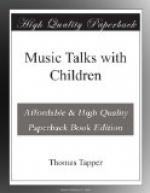“The cultivation of the ear is of the greatest importance. Endeavor early to distinguish each tone and key. Find out the exact tone sounded by the bell, the glass, and the cuckoo.”
There is certainly a good hint in this. Let us follow it day by day, and we shall see how many are the tones about us which we scarcely ever notice. We should frequently listen and find who of us can distinguish the greatest number of different sounds. Then we shall learn to listen attentively to sounds and noises. Bit by bit all sounds, especially beautiful ones, will take on a new and deeper meaning to us; they will be full of a previously unrecognized beauty which will teach us to love music more and more sincerely.
In order that we may better understand how sounds are related to each other we should learn early to sing the major scale so that it will go readily up and down as a melody. As we become more and more familiar with it we must think frequently of its separate tones so as to feel just how each one sounds in the scale, how it fits in the scale, and just what it says, in fact; we shall then notice after a while that we can hear the scale with the inner ear, which is finer and more delicate.[13]
We should have names for the scale-tones like the pretty Italian syllables, or, if not these, whatever our teacher suggests. Then we should have a conception of the tones as they are related. We should learn that every tone of the scale is colored by the tonic. Every one gets a character from the tonic which tells us all about it, because we learn to hear its relation to its principal tone. In a little while, with patience, we shall be able to hear the scale-tones in any order we may choose to think them. That power will be a fine help forever after—we must be sure to get it in the first days.
Whenever we hear two tones we should try to find them on the piano. This will make us listen more attentively to the tone sounded by the clock, the church-bell, the bird, the drinking-glass. And what a lot there are, like the squeaking door, the cricket, the noise of the wind and rain, the puff of the engine, and all the other sounds we hear in a day. Bit by bit, in this way, our familiarity with tones will grow and we shall be well repaid for all the trouble. Gradually we shall become better listeners—but about listening we are to speak in our next Talk. This, however, may be said now: Let us always be sure to listen with special care to two tones, calling one the tonic, or first, of the major scale and finding what degree the other is, or near what degree it lies. This will make us better acquainted with the scale and we shall learn that all the music we have comes out of it.




